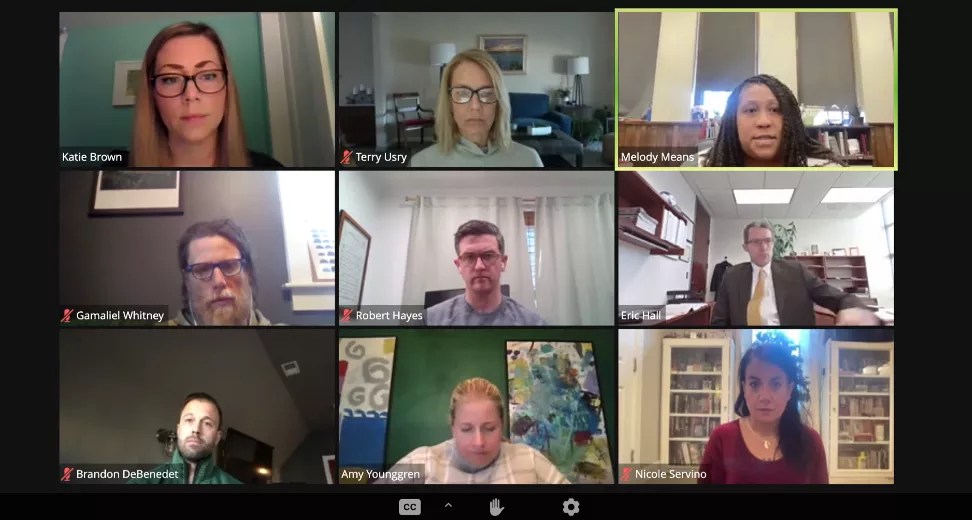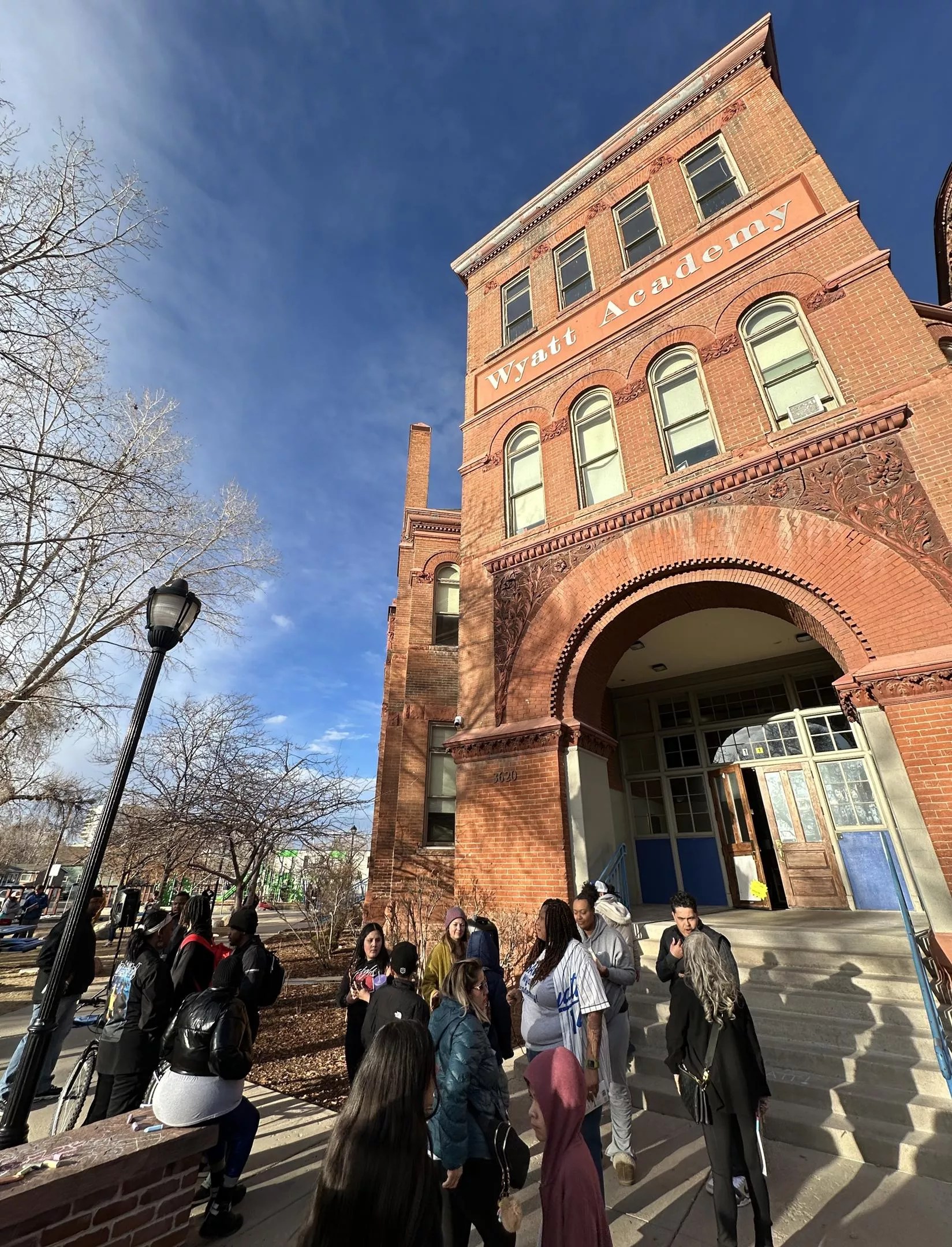
Zoom/Wyatt Academy

Audio By Carbonatix
Speaking to Wyatt Academy’s board of directors early on February 13, the Denver charter school’s principal, Melody Means, pleaded for a “chance to fight” for something “historical.”
“We have not exhausted our options,” Means said ahead of an 8 a.m. board vote on whether to shut Wyatt and merge the Cole neighborhood charter school with nearby University Prep – another K-5 charter school that operates two campuses in the Clayton and Curtis Park neighborhoods. The board had shared news of the merger move with the “Wyatt family” two weeks earlier, saying that “leadership” problems at Wyatt and issues related to fundraising, under-enrollment and an inability to pay competitive teacher salaries had forced the board to agree to a partnership with UPrep and transfer of assets to the school – without an official vote or any approval from Denver Public Schools.
“We are not doomed,” Means insisted. “We are doing the work. … The work is happening…and there’s no reason to say we can’t have a chance to keep these doors open.”
And then Wyatt Academy was given that chance, by a 5-4 vote of the board (although five were in favor of closing, the motion needed a majority vote of 60 percent to pass). Eight of the nine boardmembers are white, while Wyatt has a student population of 193 non-white students and just 22 white students.
“That was my whole point,” Means says of the race disparity between Wyatt’s board and the people actually teaching and learning at the school. “I really felt like in the conversation I was having with people, that wasn’t [the board’s] choice to make. I was like, ‘This is not your closure. You haven’t been here. This school has been open since the 1800s – as a community building, as a staple – and you want to be the people to close that? That’s what you’re going to be known as. And that’s not a weight you want to carry.”
Wyatt occupies the former home of Hyde Park School, which opened in 1887 and was abandoned in 1981. It was reopened in 1998 as the Wyatt-Edison Charter School by the education services company Edison Learning, and served students from kindergarten to eighth grade up until the 2013-2014 school year, when the partnership with Edison was scrapped following a multi-year decline in test scores.
Reports of a possible closure swirled then, too. Instead, it became Wyatt Academy, a K-5 school also under a DPS charter. “When I started as an elementary teacher here, that’s what we were talking about,” Means remembers. “Our principal at the time, Joe Taylor, stood us up, and we fought. And I’ve been using that same energy.”
Shortly after the February 13 board meeting, the five members who’d voted against keeping the charter school open – Amy Younggren, Katie Brown, Brandon De Benedet, Tyler Lane and Harsha Sekar – all resigned, according to school officials. Sekar was Wyatt’s only non-white boardmember.
“The vote about closure has been hard on everyone,” they said in a joint statement. “Our votes to close were made after years of service to the school, an intimate understanding of the strengths and challenges facing it, and a desire to act in the long-term best interests of Wyatt’s families and the neighborhood. We did not make any of our decisions lightly. Given the board’s decision not to close, it is time for us to now resign from the board and let others lead the school. Please accept our resignations effective immediately. We wish Wyatt the best in the future.”
Over the past few weeks, Wyatt’s board had claimed it anticipated “attrition in the near-term,” and said that if the school opted against pursuing a merger with UPrep, the board would be “compelled to undertake considerable efforts in the upcoming years, especially in areas of leadership and fundraising.”
But before the vote, Means pushed back on the enrollment claims. “We went from 190 to 205 two years ago,” she told the board. “We are going to hit 225. We are at 215 right now. In DPS, we are the only school in this zone that was projected 8 percent higher.” She said that DPS projects that Wyatt will increase its enrollment from 215 to 225 in the next school year.
“It’s a stretch goal,” argued De Benedet. “It’s an unrealistic scenario.”
Means fired back: “I don’t think it’s a stretch goal. We are following suit for where we need to be. … All I’m asking for is a chance to prove it.”
Boardmember Nicole Servino, who voted in favor of keeping Wyatt open, agreed with Means that the administration deserved the opportunity to try and meet its projections, rather than “taking the choice away from them” by way of a board vote. “Community and school leaders deserve to have a say in the process,” she said during the meeting.
“Wyatt fights,” Means told the board. “We need somebody there who is ready to fight for this community, not just go ‘I’m going to wash my hands of it and close the school.'”
Throughout the ninety-minute meeting, Means went back and forth with boardmembers about their concerns. She said that recruitment would be “the most important thing that is going to drive Wyatt’s longevity,” and a collective of partnerships and donations could help “change the tide.”

Wyatt Academy’s student population is made up of 193 non-white students in grades K-5 and just 22 white students.
Westword
One possible team-up would be with Clara Brown Commons, a mixed-income affordable-housing community near the school that holds 78 families “who are all encouraged to attend Wyatt,” according to Means. There’s also a partnership with ViVe Wellness being discussed, which would see the Denver nonprofit use Wyatt as a center of education for migrant families, either through schooling provided by Wyatt teachers or ViVe-certified educators with Venezuelan backgrounds.
“We’re very excited,” says Yoli Casas, executive director for ViVe. “This will be an amazing partnership in the neighborhood that we are serving, and also, for those new migrant children that are arriving – there are thousands – we can give them a school to go to that makes them feel comfortable. These children need to have teachers they can relate to.”
ViVe got interested in the partnership, which would rely on the financial backing of donors and migrant foundations, because of Wyatt’s large BIPOC student and teacher population, according to Casas. She notes that children from Venezuela and elsewhere arriving in Denver have been going to a number of schools that don’t specialize in bilingual Transitional Native Language Instruction for Spanish-speaking students; she and Means have talked about getting this at Wyatt.
“We want to make kids feel like they belong,” Casas says. “You need that combination, you need that culture to match. It’s going to start with a summer camp later this year to start getting kids to want to go to Wyatt. We’ll be getting these migrant children into summer programs and hoping they will then get registered. I think once people see we can get the interest going and the school going, foundations and donors will step in for the benefit of the children.”
ViVe has access to hundreds, perhaps thousands of kids who could begin attending Wyatt as soon as next year with help from the migrant-focused nonprofit, which plans to start making pitches to families in the coming months. “We’ve already started to organize for the summer,” Casas says. “Now that we got this exciting news, we are going to start looking.”
ViVe would provide Spanish-speaking teachers for Wyatt and pay the salaries of these teachers and any other Spanish-speaking educators who are hired and deal with the migrant students directly, Casa confirms. (Means had been questioned when she told that to the board.)
“For right now, we can definitely help field the salaries for the Spanish-certified teachers, but we’re going to need more,” Casas says. “The goal may be that we help with the salary for four or five teachers who are experts. It will just depend on how many are needed.”
Here was the scene at Wyatt, when the board voted against closing the school. pic.twitter.com/VlFAHMozX9
— Auon’tai M. Anderson (@AuontaiAnderson) February 13, 2024
But in order for Wyatt and school leaders to officially move forward, Means says, they are going to need to see some accountability from boardmembers – starting with the resignation of the five individuals who voted to shut down the school.
“If they’re not ready to come along and they’re not ready to work, then the right thing to do is to step down from the board,” she adds. “We need to turn over this board and put a process together where everybody’s involved who’s making decisions at the school. And maybe that’s doing an election; maybe it’s where they have to go through a certain amount of things to be on the board. But that system is a broken system that we need to fix.”
Former DPS board vice president Auon’tai Anderson, who now runs the new Center for Advancing Black Excellence in Education, had been threatening legal action against the board, saying that it could be illegal to call for a vote to close the school without notifying DPS.
“Without any proof or reason, we were seeing these individuals say things like, ‘We’re going through a leadership transition, and we don’t want to look for a new leader and we don’t want to fundraise.’ They don’t want to do their damn job,” Anderson blasted before the February 13 board meeting.
“If you don’t want to do your job, move out the way so that nine competent people can step in and do it for you,” he added. “We have people ready to set up and be the school board of the school that want to do the job, that want to fundraise, that want to help these children. But right now we have the same gatekeeping forces, and it’s reminiscent of Jim Crow, of a Jim Crow school that wants to take away the education from black students and doesn’t want to integrate schools, and so their only alternative is to take away the entirety of that school – the school experience – from a group of students because they don’t want to do their job.
“This school not only has a long history within our community, but it has done nothing wrong academically,” Anderson added, pointing to Wyatt’s recent record. “If we were talking about a school that’s low-performing, wasn’t meeting academic expectations or the needs for our BIPOC children, that would be one conversation. Because then we could say, ‘This school is failing, it’s failing our Black and Brown community members.’ But that’s not the case here, and it’s one of the reasons why I’m fighting as hard as I can to support them, because I believe this will set a dangerous precedent for charter schools and for charter communities to come.”
But then came the board vote…and the resignations. What Wyatt needs most right now is people who are “ready to be invested in Wyatt’s great comeback,” not individuals who don’t believe in it, Anderson says. “With their resignation, we’ll be able to see a diverse board that truly looks [like] and reflects the needs of this community. And so I’m excited for that, and also I’m excited for pragmatic thinkers who are ready to serve.”
“Let’s put some people in there that are ready to make progress, push forward and not hold us back,” Means concludes. “We are very aware that we have a lot of work to do. But we’re ready to answer that call.”